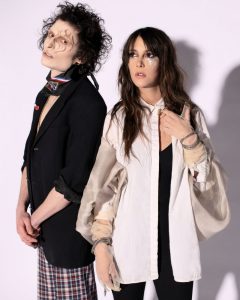 There are beings who know they’re condemned to live a joint existence, but unaware of its true nature at first glance, because it’s so easy to confuse an extraordinary creative bond with romantic love. Such is the case of Julia Daigle and Pierre-Luc Bégin of Paupière, whose life as a couple failed, but whose musical project is doing quite well, thank you, in Québec, Europe, Southeast Asia, and South Korea.
There are beings who know they’re condemned to live a joint existence, but unaware of its true nature at first glance, because it’s so easy to confuse an extraordinary creative bond with romantic love. Such is the case of Julia Daigle and Pierre-Luc Bégin of Paupière, whose life as a couple failed, but whose musical project is doing quite well, thank you, in Québec, Europe, Southeast Asia, and South Korea.
You’d think they were from another era, like one of those biographical passages one reads on the walls of museums during a retrospective exhibition of a great painter, long gone. There’s an artistic aura to Daigle and Bégin that one can imagine permeating even the smallest part of their daily lives. They’re like artworks themselves, right down to the way they dress.
Unsurprisingly, Daigle started out as a painter and hat-maker in Québec City. Bégin, on the other hand, cut his teeth with the band Polipe (a formidable but almost-forgotten trio), but he was in town because he’d recently joined We Are Wolves and the band was on tour.
“I knew Vincent Lévesque and Alex Ortiz of We Are Wolves,” says Daigle. “When they changed drummers, they hired Pierre-Luc. We got along super-well. To be honest, we were a couple when I moved to Montréal,” she confesses with a giggle. “We were together for three years. We started by painting together, and at some point, he suggested I write the lyrics to a song, because it’s something which I was always interested in. Then, he asked me if I’d like to sing. That’s how our first single, ‘Cinq heures,’ was born. I find the realm of music the most satisfying because it involves a bit of everything else. I was able to collaborate on the cover art, work with the videos’ directors… I derive a lot of satisfaction from the visual aspects.”
The title of their latest album refers to how Julia and Pierre-Luc met, to the time that binds them to each other, almost in spite of themselves. Sade Sati isn’t Latin; it’s the name of one of the principles of Indian astrology, a seven-and-a-half-year cycle, which is the total age of the band. In the meantime, Éliane Préfontaine, an actress with the gaze of the sun, has joined them as a keyboardist and vocalist. She stayed on as the band’s third player until she decided, very recently, to have a baby. After one LP and two EPs, the Paupière adventure had come to term. “It wasn’t an acrimonious separation,” Daigle insists. “We’re still friends, it’s just that she wanted to have a child. It’s not one of those sad ‘band splits up’ stories. We’re super-happy for her.”
There’s been much written in the press that Paupière revives or emulates the sound of the 1980s, a comment that rightly annoys the band members. “It’s really the choice of instruments that imparted this colour because Pierre-Luc and Éliane played piano and synths,” says Daigle. “Ultimately, we’re inspired a lot by ‘chanson française,’ by the music of the ’70s – we both love prog rock – but I understand the comparison because of the synthesizers and the bass lines. That said, I don’t think our compositions are necessarily dated.”
That said, Daigle and Bégin have often said in interviews that they think of, and identify, themselves as punks at heart. But how is it that these same punks make such catchy, melodic, and seductive music? Daigle repeats and ponders the question: “I think it’s the raw energy we exude on stage,” she says. “It’s quite aloof. We don’t necessarily respect codes. Pierre-Luc almost always ends up half-naked. We never quite know what to expect. Our punk side comes out in our attitude.”